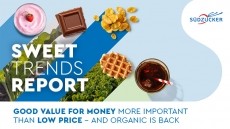Weekly Comment
Death to the industry conspiracy theories!
benefits of food and drink products are biased. Don't believe
anything that has an industry sponsor.
OK, I'm exaggerating, but this is along the lines of Boston-based researchers who recently reported that industry-sponsored nutritional beverage studies were more likely to report "favourable results" for the sponsors, than those with no industry sponsorship.
Therefore, they're biased!
Oh, Heaven save us! Enough of the conspiracy theories!
It is important to have an independent watchdog for both industry and academia, but the statements of subtle bias, or insinuations of industry meddling merely serve to undermine scientific integrity, industrial sponsors, and consumer confidence.
After starting with 538 articles, the reviewers, from the Children's Hospital Boston and the Center for Science in the Public Interest (CSPI), whittled this down to 206 according to their specific inclusion/ exclusion criteria. Of these, only 111 declared financial sponsorship - 22 per cent were funded entirely by industry, 47 per cent had no industry funding, and 32 per cent had mixed funding.
They then calculated that the 22 per cent declaring an industry-only source of funding were four to eight times likely to report favourable conclusions for the sponsors than studies with no industry funding.
And this led to the researchers to imply: Bias! Industry meddling! Company heavyweights leaning on the little academic!
Let's just think about this for a moment.
First of all, the studies used in the review were all published in peer-review journals, meaning independent and anonymous reviewers had already passed their expert eyes over the studies.
Undoubtedly, the studies fitted in with other results - in vitro research, and in vivo animal studies, as well as other human studies. I have never seen an article published without supporting references - have you? Some of the studies were clinical interventions.
Everything looks ok, so far…
Next up is the role of industry in funding a study. As was stated in an insightful, balanced, and levelheaded editorial by Martijn Katan from the Vrije Universiteit in Amsterdam that accompanied the review, when industry plans to fund a study, it is natural that it would select a product with a potentially favourable nutritional profile.
Finally, some sense!
Having worked in research, on both academically and industrially sponsored projects, I know what goes on. From my experience, if industry gives you a project then it's more likely to succeed than not. When we're talking about finished products, I'm sure the odds increase further.
To be able to sponsor a project that has an external/ university-based partner, most, if not all, companies require an extensive project proposal with the project planner under pressure to deliver positive results.
Does this mean the project planner leans on the external/ university-based researchers to deliver positive results, or that he/she has done enough science to be sufficiently confident that the product to be tested really will give positive results? I'll give the scientists the benefit of the doubt and plump for the latter.
It's when there's the null or negative result that the questions should be raised, since these may go unpublished for a variety of reasons - a null or negative result may mean the company goes back to the drawing board (no need to draw attention to something that doesn't work); or a null or negative results, while no use to the company, may alert competitors to sensitive areas of research.
Again, in agreement with Dr. Katan, how likely is it that industry would specifically fund a study into potentially unfavourable effects? Toxicology studies aside, proposing paying for a clinical trial into unfavourable effects won't make you too many friends at a company.
Moral of this little story: Positive results get published much more often than null or negative ones. Does this mean that the results quoted by the Boston-based reviewers are biased?
I think not. Merely a reflection of the mountains of work that went into product development before we get to the clinical trial stage.
In previous comments, I have trumpeted the call for transparency in science, that researchers should be honest with where their money has come from, regardless of how big or small.
That view would never change, but transparency of authors should not be used against them merely because they report positive or favourable results.
The final point to note is that research is driven by industry. Sources of independent funding for many, many university researchers are few and far between and many are very grateful for industry sponsorship.
Such partnerships are vital, and companies that put money up for university-based research should be applauded.
Stephen Daniells is the Food Science Reporter for NutraIngredients.com and NutraIngredients-USA.com. He has a PhD in Chemistry from Queen's University Belfast and has worked in research in the Netherlands and France.
If you would like to comment on this article please contact stephen.daniells'at'decisionnews.com.




















